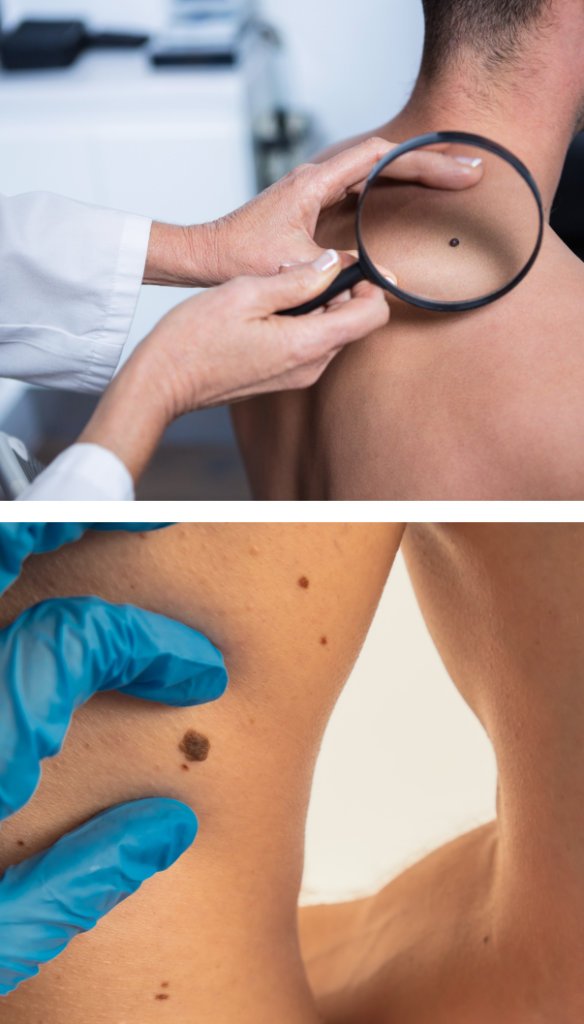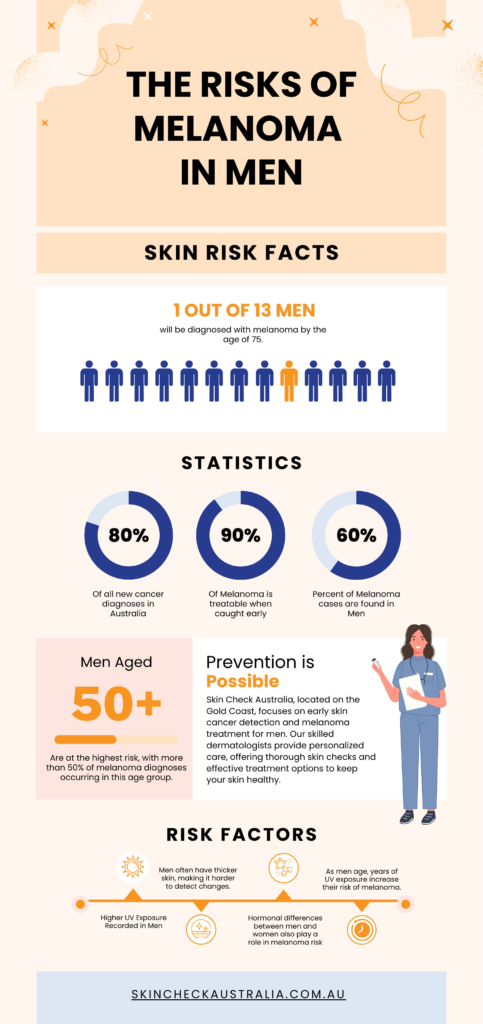Melanoma Risk in Men: Why Men Are More Likely to Develop Skin Cancer and How Skincheck Australia Can Help
Melanoma, a type of skin cancer, has seen increasing rates in recent years, with men facing a significantly higher risk of diagnosis and mortality compared to women. In this blog, we explore the higher melanoma risk in men and why men tend to get diagnosed with melanoma at higher rates.
At Skin Check Australia, a leading skin cancer clinic on the Gold Coast, we specialise in the early detection and treatment of skin cancer, with a special interest in preventing the spread of melanoma in men and women, as well as creating ways to help particularly men suffering with melanoma-related skin issues.
Melanoma: A Growing Concern and Risk in and among Men
Melanoma is a malignant melanoma that starts in the pigment-producing skin cells. It is one of the most dangerous types of skin cancer, and unfortunately, men face a higher rate of melanoma diagnosis and a greater risk of dying from this form of skin cancer compared to women. According to the Cancer Council, 1 in 13 men will be diagnosed with melanoma by the age of 75. This figure reflects the growing incidence of skin cancer among men, making melanoma a critical concern for their health.
Men aged 50 and older are particularly at risk, with the incidence of melanoma doubling in this group. Recent statistics show that men are twice as likely to die from melanoma as women, highlighting the need for skin cancer screening and early detection.

The Key Factors Behind the Higher Risk of Melanoma in Men
Several risk factors contribute to the higher rate of melanoma
diagnoses among men. These include biological, environmental, and lifestyle factors, all of which increase their likelihood of getting melanoma.
Here’s why men face a higher risk:
1. Higher UV Exposure: Men often have greater exposure to UV radiation, a major risk factor for melanoma. Whether due to outdoor work, hobbies, or recreational activities, men tend to spend more time in the sun, increasing their chances of developing skin cancer. Sun protection is often neglected, especially among men who may not be as aware of the risk of being diagnosed with melanoma due to prolonged sun exposure.
2. Thicker Skin and Delayed Detection: Men generally have thicker skin than women, making it harder to detect changes in the skin during self-examination. This means melanoma of the skin may go undetected until it reaches a more advanced stage. Early detection of cutaneous melanoma significantly improves the prognosis, but men are less likely to perform regular skin self-examinations, which delays diagnosis and treatment.
3. Genetic Factors and Hormonal Differences: Research has shown that genetic and hormonal differences between men and women also play a role in melanoma risk. Certain genes associated with malignant melanoma are more prevalent in men, contributing to their higher risk of melanoma. Additionally, men are more likely to contract melanoma on areas of the body that are less exposed to the sun, such as the back or soles of the feet, which are harder to inspect regularly.
4. Age and Accumulation of UV Damage: As men age, the cumulative UV exposure over the years increases their risk of developing melanoma. UV damage accumulated throughout a man’s lifetime can trigger melanoma progression and contribute to the melanoma incidence rates seen in older men.
Important Key Melanoma Risk Statistics for Men
Melanoma is a growing health concern for men in Australia and worldwide. Here are some key statistics to highlight the disparity in melanoma between genders:
- Skin cancer is responsible for approximately 80% of all new cancer diagnoses in Australia.
- Men aged 50+ are at the highest risk, with more than 50% of melanoma diagnoses occurring in this age group.
- Men are more likely to get melanoma on their torso, while women typically get melanoma on their legs. This difference in melanoma incidence is important for skin cancer screening, as it emphasizes the need to check all areas of the body.
- These statistics clearly show that men face a higher melanoma risk, making regular skin checks essential to catch any early signs of melanoma of the skin.
These statistics clearly show that men face a higher melanoma risk, making regular skin checks essential to catch any early signs of melanoma of the skin.

The Importance of Regular Skin Checks: How Skincheck Australia Can Help
At Skincheck Australia, we specialise in early detection and prevention of melanoma and other skin cancers. Regular skin cancer screening is critical for men, particularly those at higher risk due to their age, lifestyle, or family history.
If you notice unusual changes, are concerned about your skin health or have a history of skin cancer, book an appointment with one of our experienced doctors. Our skin cancer clinic in Robina provides a full range of services, from diagnosis and treatment to ongoing care.
Don’t wait for the signs to become serious—schedule your skin check today and protect yourself from the dangers of skin cancer.
How Regular Skin Checks Can Help Reduce Your Risk For Men
It’s essential to understand that melanoma is 90% treatable when caught early. If you are at a higher risk of developing melanoma due to factors like UV exposure, genetics, or age, a regular skin check can help reduce your risk of facing advanced melanoma. Skin check Australia is here to help you take proactive steps with preventive skin cancer treatment to monitor your skin’s health and address any changes before they become a serious problem.
Stay safe and healthy – your skin will thank you!

Skin Clinic Australia: How We Help You With Your Melanoma Skin Cancer Concerns
Be Proactive With Your Skin Health: Book Your Next Skin Check Today
Skin Check Australia is a leading skin care clinic in the Gold Coast specialising in the early detection and treatment of skin cancer, with speciality in melanoma treatments for men. With a team of experienced dermatologists and skin care professionals, we offer comprehensive skin checks, advanced treatment options, and personalised care to ensure your skin remains healthy and protected. Whether you’re in need of a routine check-up or more specialised care, our experts are committed to providing the highest standard of skin cancer care.
